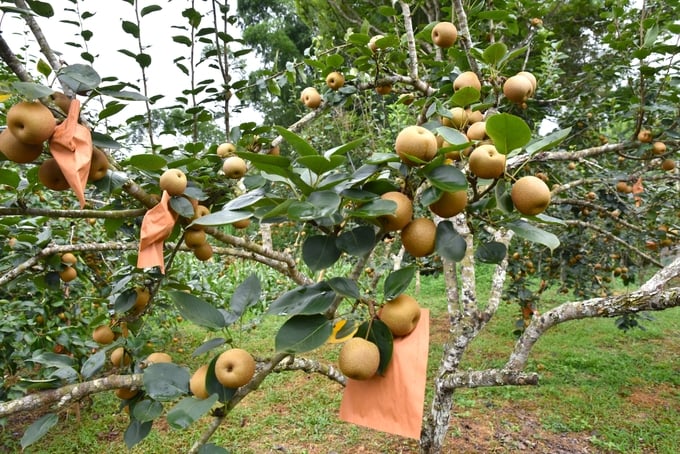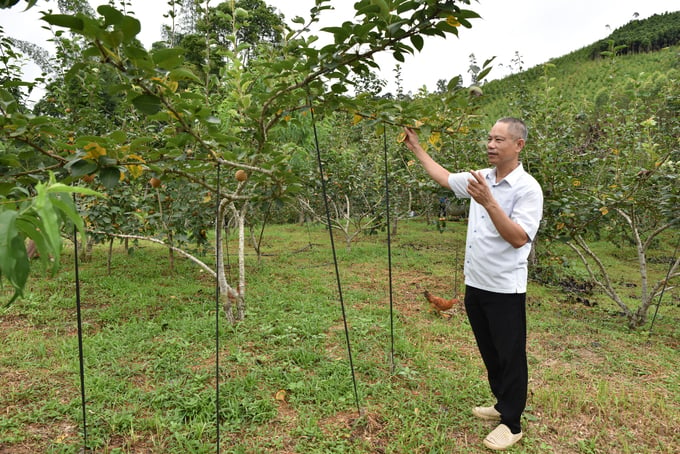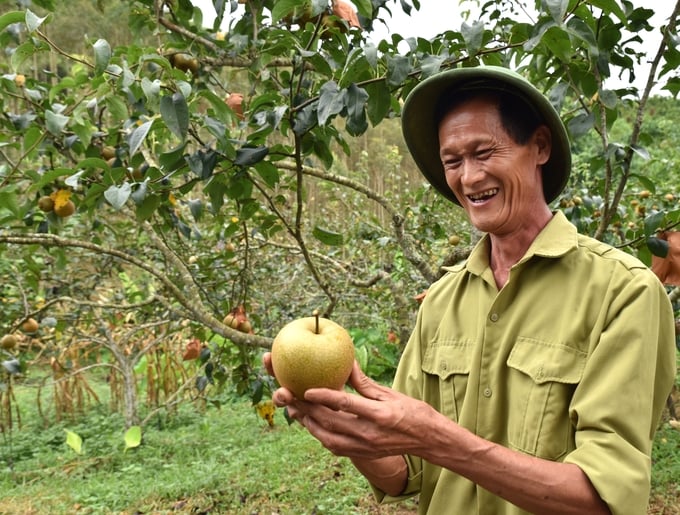June 18, 2025 | 06:12 GMT +7
June 18, 2025 | 06:12 GMT +7
Hotline: 0913.378.918
June 18, 2025 | 06:12 GMT +7
Hotline: 0913.378.918
Professor Vu Manh Hai presented me with a big pear that he had harvested from the garden of Mr. Hoang Van Khi in Na Khau village, Doi Can commune (Trang Dinh district, Lang Son province). He informed me that the pear was a Heng Shan variety. Although it is not yet mature, it appears pretty appealing. Its flavor is inferior to Mi Xue's; however, it is advantageous because it matures later, with an average weight of 400-500 grams per fruit and a thick epidermis, facilitating long-distance transportation.

The beauty of pears. Photo: Duong Dinh Tuong.
He grabbed my hand to indicate the pear trees whose branches were allowed to grow naturally straight up. He explained that they did not flower; if they did, the fruit set was minimal and the quality was limited. The two primary reasons are that the total photosynthetic product generated and accumulated from the above-ground components (stem, branches, leaves) is restricted, and the quantity of hormones that induce flower bud differentiation in straight-growing branches is significantly lower than that in horizontal or inclined branches. Pear trees and temperate fruit trees, in general, exhibit weak fruit sets and flowering when allowed to grow naturally without applying appropriate pruning and shaping techniques. It is once again confirmed that pruning techniques significantly influence temperate fruit trees.
The orchards where scientists have implemented their techniques and maintained them for decades, such as Mr. Hoang Van Khi's garden, have sustained and expanded their area, as confirmed by Dr. Le Thi My Ha of the Fruit and Vegetable Research Institute. Conversely, in other regions where trees are naturally cultivated, the results are inconsistent; while some years are abundant, others are not, which reduces economic efficiency.
Grafted pears commence fruit production in the third year, produce fruit in the fourth year, and establish a consistent output by the eighth year. For instance, each pear tree in Mr. Khi's garden yields approximately 30 to 40 kg of fruit, sold at 25,000 VND/kg for large fruits and 20,000 VND/kg for varied sizes, resulting in a total of 600,000 to 700,000 VND. Mr. Khi and his wife generate a substantial income by cultivating over 100 pear trees.
He also raises free-range poultry in the garden to control weeds and pests, which benefits the pear trees. Free-range chickens produce substantially sweeter and tastier meat, resulting in a higher price. This is because they consume pests. Young hens are priced at 120,000 VND/kg, while castrated hill poultry are sold for 150,000 VND/kg.

Dr. Bui Quang Dang - Head of Science and International Cooperation Department of Vietnam Academy of Agricultural Sciences inspects Heng Shan pear variety. Photo: Duong Dinh Tuong.
Nevertheless, Dr. Bui Quang Dang, the Head of Science and International Cooperation at the Vietnam Academy of Agricultural Sciences, observed that the application of science and technology by the residents of this orchard is still restricted, at approximately 50%. Although they have been cultivating fruit trees for an extended period, they do not produce for commercial purposes; rather, they do so for personal consumption. Despite the guidance of scientists, their capacity to implement the techniques is restricted by their propensity to concentrate on annual crops, including cassava, sweet potatoes, rice, and maize.

Branch screwing technique to make pear trees bear fruit. Photo: Duong Dinh Tuong.
"Upon learning about Mr. Khi's pear-growing model, individuals flocked to purchase it, and local officials also placed orders as gifts." Dr. Bui Quang Dang stated, "Mr. Khi, who is obliging, continues to harvest and sell, which may have an impact on the long-term reputation of these high-quality imported pear varieties." The Vietnam Academy of Agricultural Sciences has been conducting the "Developing Certain Temperate Fruit Trees with Advantages in the Northern Mountainous Region" project since 2019, as per Dr. Dang. Nevertheless, the potential of fruit trees, mainly temperate fruit trees, is not completely revealed by research conducted over five years.
"We have identified two pear varieties that are particularly well-suited to the conditions of the northern mountainous provinces. We will soon announce their circulation and officially introduce them into production." The institute intends to partner with local seed production facilities to capitalize on recognized primary plantations, such as Mr. Khi's, for communication and distribution to farmers.
In addition to pears, the institute has recently imported and established production of several other fruit tree varieties, including plums and persimmons, in Moc Chau, Son La province. Dr. Bui Quang Dang stated, "This year, we intend to announce the circulation of a new plum variety and two new peach varieties, which have significant potential in terms of quality and yield, as well as accompanying care techniques."
Professor Vu Manh Hai has stated that Vietnam has experienced setbacks in cultivating temperate fruit trees due to a lack of comprehensive research into the natural conditions. A typical example is the initiative to cultivate Western apple varieties in the Quan Ba district of Ha Giang province.

Mr. Hoang Van Khi excitedly stands next to a large pear. Photo: Duong Dinh Tuong.
From the outset, numerous fruit tree scientists, including Mr. Hai, maintained that cultivating Western apples in Vietnam was unfeasible. Indeed, the endeavor was unsuccessful a few years later due to the trees' inability to produce fruit or flowers.
Fruit trees are distinguished by their longevity, and technical errors can have a lasting impact beyond the tree's estimated lifespan of 1-2 years. The production of a fruit tree is not as straightforward as that of forestry trees or vegetables. The greater the quality of a forestry tree, the greater the number of products it can produce. However, a fruit tree may be extremely robust and still fail to produce fruit or flowers.
Fruit tree cultivators must possess significant knowledge to maintain equilibrium between the vegetative growth and reproductive development processes. Consequently, the knowledge imparted to fruit tree cultivators is of great importance.
Even though geographical locations may not be far apart, one location may be conducive to growth, whereas another location located only a few kilometers away may not be. This is due to latitude, altitude, micro-topography, and wind direction. These conditions are of paramount importance. Consequently, farmers must ascertain whether their property can support temperate fruit trees and, if so, which types and specific varieties are suitable. Certain varieties necessitate high, medium, and low temperatures within a category, such as apricots.
The second point is that producers must comprehend the necessary technical interventions. The limited knowledge of the cultivators is the primary reason local and temperate fruit trees have not significantly contributed to Vietnam's economy. Despite its cold climate comparable to Vietnam's northern mountainous provinces, Taiwan boasts highly skilled scientists and practical experience. Therefore, Vietnam must acquire knowledge from Taiwan, particularly in incorporating new temperate varieties and techniques into its production process.
Translated by Linh Linh
/2025/06/17/3942-2-143243_548.jpg)
(VAN) Recently, in Sweden, the Secretary of the Binh Dinh Provincial Party Committee presented the Investment Registration Certificate for the 'Polyester Fabric Recycling Complex' project to SYRE Impact-AB Company.
/2025/06/12/3721-2-202745_83.jpg)
(VAN) TH made an impression at Seoul Food 2025 with its line of natural beverages, paving the way for Vietnamese food products to enter the South Korean market.

(VAN) Soc Trang's success in rice exports stems from a strategy of developing fragrant and specialty rice cultivation areas and standardizing production toward low-emission practices.
/2025/06/11/1311-5-120811_839.jpg)
(VAN) The pig farming industry is facing the challenge of comprehensive restructuring to meet requirements for quality, safety, traceability, and market expansion both domestically and for export.

(VAN) Vietnam considers participating in ALGROALBA in order to expand agricultural production, coordinate the assessment and effective exploitation potential land.
/2025/06/05/5314-1-184727_407.jpg)
(VAN) From seemingly worthless fish scales and skin, enzymes and lactic ferments can transform by-products into peptides, opening a sustainable, effective business direction and elevating Vietnamese seafood.

(VAN) TTC AgriS and IFC signed a strategic partnership to develop a sustainable agricultural value chain, aiming to achieve the Net Zero target by 2035.